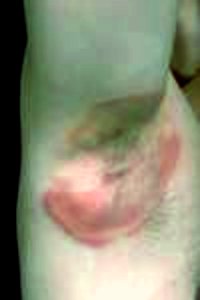|
"Non Hodgkin Lymphoma Risk Increased By Chronic Inflammation"
Non Hodgkin lymphoma is a type of cancer involving cells of the immune system. It starts in the lymphatic system, which includes the lymph nodes, spleen, and other organs of the immune system. This disease can begin or spread to almost any part of the body. According to the American Cancer Society, over 50,000 new cases are diagnosed in the US every year. This disease can occur at any age. However, the chances of developing it goes up with age. Most people with this disease are older than 60 .
There are about 29 different forms of lymphoma. These types can be divided into aggressive (fast-growing) and indolent (slow-growing) types, including follicular lymphoma. Non Hodgkin lymphoma is the fifth most common cancer inflammation after lung, breast, colorectal, and prostate cancers (Groves FD et al 2000). It is among the top five causes of cancer related death (Fisher SG et al 2004; Hauke RJ et al 2000) and is the leading cause of cancer death in males aged 15-54 (Mohammad RM et al 2003). The incidence of non Hodgkin lymphoma has been rising since the 1970s, although the reason for this increase is unclear. Medical Conditions Characterized By Chronic Inflammation, Such As:
There Is Substantial Evidence That Chronic Inflammation Can Predispose An Individual To Cancer. Chronic Inflammation is caused by a variety of factors. The longer the inflammation persists, the higher the risk of getting cancer. Acute inflammation, that occurs when you have an injury or an infection, is not regarded as a risk factor for the development of cancer. Recent study results clearly indicate an association between severity of chronic inflammation and lymphoma risk in patients with rhumatoid arthritis and Sjögren's syndrome.
Signs And Symptoms Of Lymphoma To Be Aware Of:
Anyone with symptoms of lymphoma that do not go away within 2 weeks should see a doctor so that possible problems can be diagnosed and treated if need be. Researchers are studying obesity and other possible risk factors. People who work with herbicides or certain other chemicals may be at increased risk of this disease. Researchers are also looking at a possible link between using hair dyes before 1980 and non Hodgkin lymphoma risk. Other Known Risk Factors:
Having certain types of infections increases the risk of developing lymphoma. However, lymphoma is not contagious. Having one or more risk factors does not mean that a person will develop non Hodgkin lymphoma. Most people who have risk factors never develop cancer . What Can You Expect At The Doctors Office: If you are experiencing symptoms of lymphoma, you should see your health care provider. There they will do a physical exam for:
You may also have a biopsy which is the only way to make a positive diagnosis.
Follow An Anti Inflammation Diet ! This Is Also A Heart Healthy Diet! Eat More Cold Water Fatty Fish! Eat at least 2 servings of fresh fish each week. A serving of fish is 3 to 4 ounces, about the size of the palm of your hand. Antioxidants found in vegetables and fruits will boost your immune system, and may result in reduced risk of about 40 per cent. American Journal of Epidemiology: Study finds a diet rich in:
Higher levels of vitamin D may protect against the disease. Get some exercise if possible, 5 days a week.
Fish oils may increase bleeding if you are taking blood thinning medications (including aspirin). Talk with your doctor before starting them. Always make sure you are getting a quality fish oil and that it is indeed fish oil and not flax oil or worse yet vegetable oil. Use a Pure Virgin Coconut Oil whenever you use oil for cooking or baking. It is a natural anti inflammatory. The good news is, survival rates for Stage I and II non Hodgkin lymphoma and Hodgkins lymphoma are very high. Learn How You Can Reduce Your Cancer Risk
|






